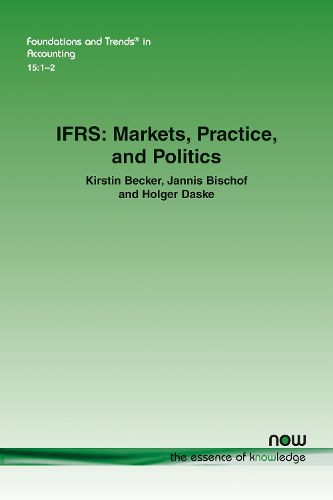Readings Newsletter
Become a Readings Member to make your shopping experience even easier.
Sign in or sign up for free!
You’re not far away from qualifying for FREE standard shipping within Australia
You’ve qualified for FREE standard shipping within Australia
The cart is loading…






This title is printed to order. This book may have been self-published. If so, we cannot guarantee the quality of the content. In the main most books will have gone through the editing process however some may not. We therefore suggest that you be aware of this before ordering this book. If in doubt check either the author or publisher’s details as we are unable to accept any returns unless they are faulty. Please contact us if you have any questions.
IFRS: Markets, Practice, and Politics reviews the academic literature on market outcomes, reporting practices and the political economy behind the global use of International Financial Reporting Standards (IFRS). Starting with a conceptual discussion of expected benefits and costs of an international harmonization of accounting regulation, the authors explain why predictions on possible outcomes are ambiguous. The first section discusses the characteristics of an ideal IFRS experiment that would allow to draw causal inferences on the effects of IFRS adoption. It offers a comprehensive overview of research on the impact of IFRS on capital markets, particularly around first-time adoption and during the global financial crisis. The second section describes current IFRS reporting practices, including digital reporting (XBRL), and benchmark the availability, accessibility, and processing of IFRS financial information against the information environment in the United States. Complementing this discussion is evidence on the use of IFRS reporting choices such as the different fair value options. The third section provides information about important institutional features of IFRS standard setting and how political powers affect decisions on IFRS adoption, standard setting, and enforcement. The monograph concludes with an assessment of the impact of IFRS research and outlines emerging trends that provide opportunities for future research. Overall, this monograph offers a summary of research findings and methods that are relevant for the analysis of future regulatory innovations, such as the international standardization of sustainability (or ESG) reporting.
$9.00 standard shipping within Australia
FREE standard shipping within Australia for orders over $100.00
Express & International shipping calculated at checkout
This title is printed to order. This book may have been self-published. If so, we cannot guarantee the quality of the content. In the main most books will have gone through the editing process however some may not. We therefore suggest that you be aware of this before ordering this book. If in doubt check either the author or publisher’s details as we are unable to accept any returns unless they are faulty. Please contact us if you have any questions.
IFRS: Markets, Practice, and Politics reviews the academic literature on market outcomes, reporting practices and the political economy behind the global use of International Financial Reporting Standards (IFRS). Starting with a conceptual discussion of expected benefits and costs of an international harmonization of accounting regulation, the authors explain why predictions on possible outcomes are ambiguous. The first section discusses the characteristics of an ideal IFRS experiment that would allow to draw causal inferences on the effects of IFRS adoption. It offers a comprehensive overview of research on the impact of IFRS on capital markets, particularly around first-time adoption and during the global financial crisis. The second section describes current IFRS reporting practices, including digital reporting (XBRL), and benchmark the availability, accessibility, and processing of IFRS financial information against the information environment in the United States. Complementing this discussion is evidence on the use of IFRS reporting choices such as the different fair value options. The third section provides information about important institutional features of IFRS standard setting and how political powers affect decisions on IFRS adoption, standard setting, and enforcement. The monograph concludes with an assessment of the impact of IFRS research and outlines emerging trends that provide opportunities for future research. Overall, this monograph offers a summary of research findings and methods that are relevant for the analysis of future regulatory innovations, such as the international standardization of sustainability (or ESG) reporting.